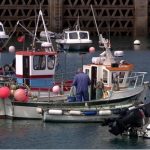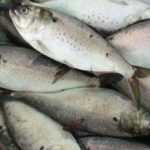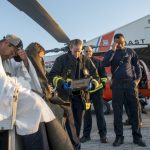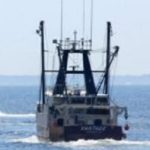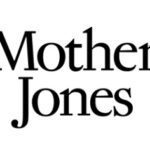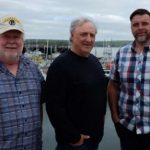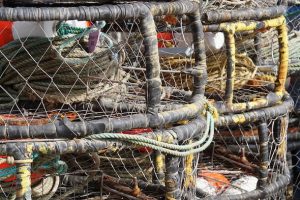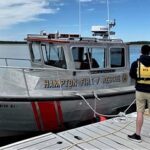SEA-NL calls for third-party investigation into DFO NL
 Seaward Enterprises Association of Newfoundland and Labrador (SEA-NL) is calling on Prime Minister Justin Trudeau to order an independent investigation of the operations of the federal Department of Fisheries and Oceans in the province amid alarming allegations of political interference raised by the CBC.
Seaward Enterprises Association of Newfoundland and Labrador (SEA-NL) is calling on Prime Minister Justin Trudeau to order an independent investigation of the operations of the federal Department of Fisheries and Oceans in the province amid alarming allegations of political interference raised by the CBC.
“DFO’s last shred of credibility in this province is on the line,” says Ryan Cleary, SEA-NL’s interim Executive Director.
“The allegations by the union representing DFO scientists not only call into question the department’s faith in itself, but what little faith inshore harvesters and all Newfoundlanders and Labradorians have left in DFO to manage the wild commercial fisheries.”
The allegations by the Professional Institute of the Public Service of Canada, the union representing DFO scientists in the province, are reportedly outlined in a November letter to the federal deputy minister of Fisheries and Oceans Canada.
Cleary notes that CBC NL has not released the letter, but has reported extensively on allegations said to be outlined in the document. The allegations include that scientific advice was altered, and that DFO “exhibited a pattern where interference with scientific work is commonplace.”
The allegations accuse lobbyists, industry — including the FFAW-Unifor, and Atlantic Groundfish Council (representing the offshore dragger sector), senior bureaucrats, and at least one politician (Minister Andrew Parsons) of undermining the work of DFO scientists in the province.
In reference to Parsons, it’s alleged that as provincial Energy Minister he “lobbied DFO to change or withhold the publication of its science advice,” which he had been leaked a copy of. The science advice reportedly involved measures to protect corals and sponges during oil and gas exploration and development.
The allegations refer to a seal task team, appointed by the federal government in 2019, which the scientists’ union alleges is not an example of the scientific community collaborating, “but rather industry influencing departmental science.”
The allegations also specifically refer to the altering of science advice regarding the cod stock off southern Newfoundland in fishing zone 3Ps as a possible way to manipulate the dwindling quota.
SEA-NL raised the allegations by the scientists’ union in mid-January during a virtual meeting of a DFO advisory group assigned to recommend this year’s cod quota for the 3Ps stock — calling at the time for an investigation.
In response, the Atlantic Groundfish Council wrote DFO to ask that the department reconsider inviting a SEA-NL representative to sit as an observer at future meetings.
“These are very serious allegations directed at the core of fishery management in the province, and to move forward we need the Prime Minister to order a thorough, third-party investigation supported by Premier Andrew Furey whose government is also implicated,” Cleary says.
The Professional Institute L’Institut professionnel
of the Public Service de la fonction publique
of Canada du Canada
November 25, 2021
Timothy Sargent
Deputy Minister
Fisheries and Oceans Canada
200 Kent St, Ottawa, ON K1A 0E6
E-mail: [email protected]
Object/Sujet: The undermining of scientific processes and excellence in the Newfoundland and Labrador Region
A perspective from the Professional Institute of Public Service Canada’s members from the Newfoundland and Labrador Region.
Subdivision 3Ps. Specifically, the FFAW and AGC questioned whether recent stock assessments represent an accurate interpretation of the available science.
signed a memo for the Minister that recommended the appointment of the review panel. On May 25, 2021, the Minister’s Office issued a letter to the FFAW and AGC stating that their request for a review panel would be approved.
maybe later called into question for reasons that are not based on science, but on other justifications outside of scientific standards. As a consequence of this, other departmental priorities have been impacted as scientists have had to move resources away from important projects to support the review panel’s deliverables. It should be emphasized that the underlying concern expressed by our members is not with respect to external review of the 3Ps cod model, as external expert review is already a regular component of the departmental science processes, which our members fully support and encourage. Our members’ main concern is that the Minister’s decision to appoint a review panel, as per the request of lobbyists, circumvents and undermines the Department’s well-established peer review process. The creation of the review panel is perceived by members as a consequence of stakeholder interference in the scientific process of our department, and several of our members have expressed concern that the review panel is a violation of the Fisheries and Oceans Canada’s Scientific Integrity Policy (Section 6.2; which states that DFO research, science, and communications are free from commercial and stakeholder interference).
In September 2020, the Department approved a request to conduct peer review process to consider an alternative Precautionary Approach Framework drafted by the FFAW. The decision to reopen the scientific discussion and review an alternative framework two years after the original peer review process undermined the scientific excellence of the Department and called into question the credibility of its science advice and of the scientists who contributed to the advice. It is a disappointing example of actions taken by the Department whereby previously peer-reviewed and accepted science advice can be reopened without scientific merit. The Department’s actions in this case have significantly stalled the implementation of a full Precautionary Approach Framework for the Snow Crab resource in NL and have inhibited a full evaluation of stock status, (i.e. the status of the stock in relation to the cautious or healthy zones of a Precautionary Approach Framework). By permitting the review of the alternative framework, the Department gave credit to false statements by lobbyists, and is perceived by our members as the Department accommodating lobbyist untruths aimed at impacting the credibility of its Science program. This has led to a resonating lack of trust among scientists, stakeholders, and management, and has caused significant burnout, fatigue, and disillusion in our members.
Other Examples and the Emergence of a Pattern
Unfortunately, the situations around the 3Ps cod assessment model, the Atlantic Seal Task Team, and the Snow Crab Precautionary Approach Framework review are not unique. Several other actions taken by the Department have exhibited a pattern where interference with scientific work
is commonplace. It should be noted that the examples below is not an exhaustive list of occurrences. Further examples, and additional details on the examples listed within this letter, can be shared at a meeting between you, the Assistant Deputy Minister of Ecosystems and Oceans Science, and our members, upon your request.
For example, during a 2019 CSAS process pertaining to the review of Grieg Seafarms NL aquaculture siting baseline assessments, the Regional Director General of the NL Region called an urgent meeting with the Co-Chairs and the CSAS Coordinator immediately prior to the start of the peer review process and requested that at the end of the meeting the Co-Chairs request a vote by participants on whether to publish the resulting science advice or postpone the meeting to a later date. This is contrary to CSAS policy and process as the findings of all peer review processes are published to support the SAGE principle (Principles and Guidance for the Effective Use of Science and Technology Advice in Government Decision-Making) of
transparency and openness.
In another example, during a January 2020 CSAS process pertaining to mitigation measures for the protection of corals and sponges during exploratory oil and gas development, a politician (NL Minister of Industry, Energy and Technology, Andrew Parsons) was leaked a copy of the
draft Science Advisory Report and lobbied the Department to change or withhold the publication of its science advice. In addition, the Department sent a letter of reply pertaining to this CSAS process to the Canadian Association of Petroleum Producers (CAPP) which reopened the review of the draft scientific report exclusively to CAPP peer review attendees, which was contrary to standard CSAS process and scientific standards. This political and stakeholder interference undermined this scientific process and encourages additional lobbying by industry and appears to our members as another possible breach to the Scientific Integrity Policy.
This pattern of interference, and undermining of science advice and best scientific practices, is also evident in the current formal complaint against DFO by members about breaches so the DFO Scientific Integrity Policy in relation to the Regional Assessment of Offshore Oil and Gas Exploratory Drilling East of NL. In this case, not only did members feel that there were breaches of the Scientific Integrity Policy by both an internal and an external client, but the investigation conducted by the Office of the Ombud did not follow due process and left members feeling that their complaints were not heard or believed. Similar examples of the Department’s willingness to undercut science advice based on falsehoods and positions by industry representatives or political/lobbyist groups have also created conflictive and uncomfortable situations between scientists and managers within the NAFO Canadian Delegation, leading to a loss of science capacity within NAFO. These complaints have not yet been resolved.
Consequences for Our Members
These cases reveal a perceived pattern of the Department undermining scientific peer review processes and credibility, and some cases point towards concerning (direct) involvement of industry stakeholders. When DFO employees answered a question on interference during the recent Science Member Survey conducted by PIPSC, an alarming 30% of DFO respondents stated that in the past 3 years they have experienced or witnessed situations where there was an interference with their department’s science-based work by businesses or industry lobbyists (which is double the rate among respondents within all surveyed Departments and Agencies). Science advice can only be considered unbiased when the scientists and scientific processes that generate that advice are seen to be free from political and stakeholder interference.
Conclusions and recommendations
We respectfully recommend that DFO take the following actions on behalf of our members to start rebuilding trust, scientific integrity, and excellence of the Department, and to ensure that similar issues do not occur again in the future:
1. Investigate the process and decision-making which led to the Deputy Minister’s 3Ps cod memo being altered and the three-person review panel being recommended.
2. Reconfirm commitment to scientific integrity and excellence by stating that science advice will not be undermined if similar situations arise in the future.
3. Recognize the impacts of the Department’s actions on DFO scientists and respond to the concerns outlined above.
4. Disband the Atlantic Seal Task Force.
5. Convene a meeting between DFO NL scientists, the Assistant Deputy Minister of
Ecosystems and Oceans Science, and you to discuss the concerns outlined above and a way forward.
As the Institute’s National Consultation Team President representing our scientists, I am bringing your attention to the above concerns and recommendations on behalf of scientists in the NL Region and their colleagues across the country whose goal is to protect the quality and
reputation of the Department’s valuable scientific work. Our scientists are dedicated staff who want the best for the Department; they have felt hurt, and still are, and have had their confidence in the Department’s scientific process undermined by the actions outlined above.
We look forward to working collaboratively and in good faith with the Department to rectify the issues noted here and to achieve our collective aim.
Thank you for your attention.
Sincerely, Judith Leblanc
DFO National Consultation Team President
The Professional Institute of the Public Service of Canada
c.c. Tony Blanchard DFO, NL Regional Director General
Atef Mansour DFO, NL Regional Director Science
Arran McPherson DFO, Assistant Deputy Minister Ecosystem and Oceans Science
Debi Daviau PIPSC, President

































